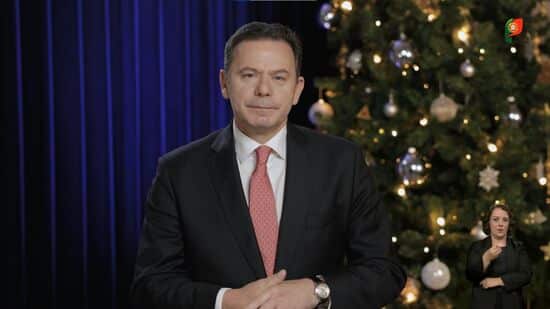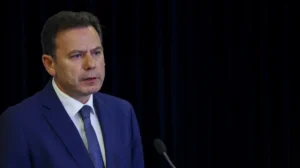PM highlights ‘work of the government’ and commitment to fighting crime
No sooner had prime minister Luís Montenegro given his Christmas message yesterday, than the majority of political parties in opposition were tearing into it.
Criticism ranged from the message being ‘divorced from reality’; to being ‘electioneering’ and at odds with the words of President Marcelo.
Essentially, Mr Montenegro’s first Christmas address to the nation was all about ‘the future’. True, he did refer “several times” (says SIC Notícias) to the problems left by the previous government (which may be why PS Socialists were the first to ‘react’, in outrage…) but he also said that the “new government has brought new priorities and options. We did not come to look at or criticise the past. We came to look after the present and build the future”, he said.
“We are improving the salaries of key sectors of Public Administration such as teachers, police, armed forces, justice officials, the prison system and the health sector,” he went on.
In the more than five minutes of his message, the PM emphasised the approval of a State Budget ‘that does not increase taxes and that increases salaries and pensions’.
As reports referred, “in the face of global uncertainty, Luís Montenegro puts Portugal on a level playing field in terms of both stability and opportunities”.
“We will promote regulated immigration to welcome those who choose to live in our country with dignity and humanism”, he said.
And he guaranteed a country with more public housing, more mobility and better public transport, as well as one committed to fighting economic crime, drug trafficking and violent crime, in order to remain one of the safest countries in the world.
Considered critically, Mr Montenegro was simply saying what he has been saying, one way or the other, for the last few weeks. There was nothing ‘new’ in the speech. But that hasn’t stopped the deluge of criticism.
PS parliamentary leader Alexandra Leitão accused the government of “riding on a perception of insecurity that is not real”. Worse, in doing so, it is taking advantage of this misplaced perception “to drift into totalitarian populism”.
What has upset the PS most is not simply the police operation last week in Martim Moniz (which some sources say was actually nothing new, or particularly worrying, while other sources say it was sign of a descent into a police state) but also the decision approved in parliament last week to no longer freely treat foreign non-residents on the SNS national health.
This decision does not preclude foreign non-residents being treated in Portuguese State hospitals/ health centres; it sets out to ensure that they pay for their treatment (ie. do not get it for nothing). But the left-wing opposition has seen it as a blanket refusal to treat foreign non-residents, suggesting the results will be disastrous.
For Alexandra Leitão, Luís Montenegro’s Christmas message also contrasted with that of president Marcelo, who in an article in Jornal de Notícias, argued that it is necessary to “promote equality and remove exclusions”.
“It was the president’s message with which the PS could not agree more,” she stressed.
In Leitão’s opinion, the prime minister’s Christmas message intended to “divert attention from the fact that this government is not solving the Portuguese people’s problems.
“The prime minister talked about housing, he talked about health: this Christmas there were more obstetrics emergency departments closed than in recent years, yesterday or the day before we heard that housing prices have risen to record figures, making it impossible for the middle class to buy a home, in education we still have thousands of schoolchildren without teachers.
“The truth is that several months have passed, several ‘powerpoints’, several measures and when we realise what has already been done (…) they are clearly not getting results,” she went on.
On the right, CHEGA leader André Ventura also ran with the ‘divorced from reality’ theme, but in a different way: he emphasised the actual ‘insecurity’ of modern day Portugal.
“Nobody or almost nobody in Portugal can see this country, can think that they wake up in a safe country or go to bed in a safe country”, said Ventura, also referring to problems that have remained with the change of government, “or have worsened”. And he confused the situation further by suggesting the ‘new government’ that took over last March “seems to be the same as António Costa’s” (the former Socialist prime minister).
PCP communists and PAN (People’s Animals Nature) have all thrown their criticism into the ring, also referring to the fact that Luís Montenegro didn’t seem to be talking about the country that they recognise. While Bloco de Esquerda harks back to the Martim Moniz police operation, saying he ‘owes the country an apology’.
In the meantime, ‘official complaints’ have now been lodged about the police operation in Martim Moniz last Thursday which is due to be delivered to the Ombudsman in January. The operation is already the subject of an independent inquiry by IGAI (general inspectorate of public administration).




















